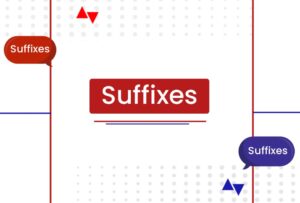Est. reading time: 5 minutes
Suffixes are small but important parts of the English language that make your vocabulary richer. By adding them to root words, suffixes create new words and enhance the ability to communicate with precision.
In this article, we will see the importance and versatility of suffixes in vocabulary development and understanding of the English language.
What are Suffixes?
Unlike prefixes, suffixes are a letter or group of letters added at the end of a base word to form variations or new words.
Suffixes add specific meanings to words, such as indicating a state, quality, action, or person. Oftentimes, most suffixes contain one or two syllables, e.g. ‘ness’, ‘ly’, ‘did’, ‘ance’, etc.
Rules for Applying Suffixes
Just like any element in the English language, suffixes have guidelines and understanding these rules will help in the correct usage of suffixes.
Suffixes follow certain rules and guidelines when added to words and here are some of them.
Spelling Changes
When it comes to suffixes, the spelling of the base word sometimes changes before adding a suffix (e.g., ‘happy’ becomes ‘happiness’ when adding the suffix ‘-ness’).
Change in Part of Speech
Suffixes can change the part of speech of a word. For example, ‘-ise’ often changes nouns or adjectives into verbs (e.g., ‘real’ becomes ‘realise’).
Another example is ‘-ly’ and it’s commonly added to adjectives to form adverbs (e.g., ‘quick’ becomes ‘quickly’).
Grammar Rules
Suffixes must adhere to grammar rules, such as subject-verb agreement and tense consistency when forming new words.
Order
Multiple suffixes can be added to a word, but are usually added in a specific order. (e.g., in “hopefulness,” the suffixes “ful” and “ness” are added to the root word “hope”).
Hyphenation
Some words may require a hyphen when adding a suffix to maintain clarity or readability. Examples of this are “sugar-free” and “nation-wide.”
Types of Suffixes
Using suffixes in a word can lead to the formation of different words that belong to different parts of speech. Suffixes, when added to a base word, can form nouns, verbs, adverbs, adjectives, and diminutive suffixes.
Suffixes can be broadly categorized based on their function in word formation. Here are the main types of suffixes:
Noun Suffix
Noun suffixes are formed when a suffix and a base word form a noun. Likewise, suffixes can change adjectives or verbs into nouns. Let’s see some of these examples below.
- -ness: Indicates a state or quality.
- Happiness (Happy + -ness)
- Darkness (Dark + -ness)
- -ment: Indicates an action or resulting state.
- Achievement (Achieve + -ment)
- Development (Develop + -ment)
- -tion / -sion: Indicates the action or process of something.
- Education (Educate + -tion)
- Decision (Decide + -sion)
- -ity: Indicates a state or condition.
- Reality (Real + -ity)
- Flexibility (Flexible + -ity)
- -er / -or: Indicates a person who performs an action.
- Teacher (Teach + -er)
- Actor (Act + -or)
- -ism: Indicates a belief or practice.
- Capitalism (Capital + -ism)
- Buddhism (Buddha + -ism)
- -ship: Indicates a state, condition, or quality.
- Friendship (Friend + -ship)
- Leadership (Leader + -ship)
- -age: Indicates an action or process, or the result of an action.
- Storage (Store + -age)
- Breakage (Break + -age)
- -hood: Indicates a state or condition.
- Childhood (Child + -hood)
- Neighbourhood (Neighbour + -hood)
- -ance / -ence: Indicates a state or quality.
- Importance (Important + -ance)
- Excellence (Excellent + -ence)
- -cy: Indicates a state or condition.
- Accuracy (Accurate + -cy)
- Privacy (Private + -cy)
- -ure: Indicates an action or result.
- Closure (Close + -ure)
- Departure (Depart + -ure)
- -ee: Indicates a person who is the recipient of an action.
- Employee (Employ + -ee)
- Trainee (Train + -ee)
Adjective Suffix
We know that an adjective is a part of speech that modifies nouns, so adjective suffixes are suffixes added to words to form words that modify nouns. These adjectives are commonly formed from either nouns or verbs.
These suffixes help in forming adjectives that describe attributes, qualities, or relationships, enriching the language and allowing for more precise expression.
Examples of adjective suffixes include the following:
- -able / -ible: Indicates capability or worth.
- Readable (Read + -able)
- Accessible (Access + -ible)
- -al: Pertains to or relates to something.
- Musical (Music + -al)
- National (Nation + -al)
- -ful: Indicates something of abundant characteristics or quality.
- Beautiful (Beauty + -ful)
- Helpful (Help + -ful)
- -ic: Pertains to or relates to something.
- Poetic (Poem + -ic)
- Historic (History + -ic)
- -ive: Indicates having the nature of or relating to something.
- Creative (Create + -ive)
- Supportive (Support + -ive)
- -less: Indicates being without something.
- Hopeless (Hope + -less)
- Fearless (Fear + -less)
- -ous: Indicates full of or having qualities of something.
- Dangerous (Danger + -ous)
- Famous (Fame + -ous)
- -y: Indicates characterized by or inclined to.
- Sunny (Sun + -y)
- Windy (Wind + -y)
- -en: Indicates made of or resembling.
- Golden (Gold + -en)
- Wooden (Wood + -en)
- -ish: Indicates having the quality of or somewhat like.
- Childish (Child + -ish)
- Greenish (Green + -ish)
- -ary: Pertains to or relates to something.
- Dietary (Diet + -ary)
- Customary (Custom + -ary)
- -ent / -ant: Indicates inclined to or relating to.
- Dependent (Depend + -ent)
- Relevant (Relate + -ant)
Verb Suffix
These suffixes, when added to words, form an action word also referred to as the verb, and this usually stems from changing nouns or adjectives into verbs.
These suffixes are integral in creating verbs that denote actions, processes, or states, thus expanding the functional range of the language.
- -ate: Indicates to perform an act.
- Activate (Active + -ate)
- Decorate (Decor + -ate)
- -en: Indicates becoming something.
- Soften (Soft + -en)
- Strengthen (Strength + -en)
- -ify: Indicates to cause or to become.
- Clarify (Clear + -ify)
- Magnify (Magnus (Latin for great) + -ify)
- -ise: Indicates to make or to engage in.
- Realise (Real + -ise)
- Organise (Organ + -ise)
- -fy: Indicates to make or to become.
- Simplify (Simple + -fy)
- Purify (Pure + -fy)
4. Adverb Suffix
These suffixes are added to words to form adverbs that modify verbs. These suffixes help in forming adverbs that modify and provide additional context to actions or descriptions.
- -ly: This is the most common adverb suffix and it indicates how something is done.
- Quickly (Quick + -ly)
- Happily (Happy + -ly)
- -ward / -wards: Indicates direction.
- Forward (Fore + -ward)
- Backwards (Back + -wards)
- -wise: Indicates manner, position, or direction.
- Otherwise (Other + -wise)
- Clockwise (Clock + -wise)
- -ways: Indicates manner or direction.
- Always (All + ways)
- Sideways (Side + ways)
- -fold: Indicates manner or degree.
- Manifold (Many + fold)
- Sevenfold (Seven + fold)
5. Diminutive Suffix
These suffixes indicate diminutives, i.e., words that indicate smallness, affection, or familiarity while adding a sweet context to it.
- -let: Often used to indicate something small.
- Booklet (small book)
- Piglet (small pig)
- -ette: Used to indicate a smaller version of something.
- Gazette (small newspaper or journal)
- Kitchenette (small kitchen)
- -ling: Used to denote a smaller or younger version of something mostly animals.
- Duckling (young duck)
- Gosling (young goose)
- -y / -ie: Often used in informal or affectionate contexts.
- Kitty (small or affectionate term for cat)
- Billy (affectionate diminutive of Bill)
- -kin: A less common suffix that conveys smallness or endearment.
- Lambkin (small or affectionate term for lamb)
- Napkin (a small piece of cloth or paper)
Conclusion
In essence, suffixes are essential components of English that enhance our vocabulary by creating new words. They influence grammatical functions and also help in reading comprehension and effective communication.


